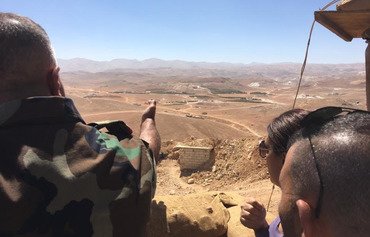The Lebanese army's drive to push the "Islamic State of Iraq and Syria" (ISIS) from a mountainous area along the border with Syria has brought to light the depth of the people's solidarity with the army, local residents said.
Since the battles began on Saturday (August 19th), residents in areas where the army is deployed have mobilised to provide soldiers with meals and assistance.
The Lebanese look to the army as the only legitimate national force to protect them and their homeland, political analyst George Shaheen told Al-Mashareq.
Today's army is an effective strike force, he said, comprising 30,000 troops, and has proven capable of carrying out high-precision military operations.
Noting the "unprecedented popular solidarity with the army", Shaheen said the ongoing Fajr al-Juroud (Al-Juroud Dawn) operation to oust ISIS from the border area "represents a new dawn for Lebanon".
Military-civilian co-ordination
In Ras Baalbek and al-Qaa, residents have been working in co-ordination with the military to provide medical attention and prepare meals for soldiers.
In Ras Baalbek, Sister Agnes Laham, head of the Monastery of Mar Yaqoub in the Qalamoun region and head of the Fils de l'Homme association in Lebanon, launched an initiative to staff the kitchen in the army barracks, marshaling hundreds of young volunteers each day to prepare meals for the army and deliver them hot to the front lines.
This initiative has drawn volunteers from the towns of Fakiha, Jdeidet al-Fakiha, Arsal, Hermel and Beirut, while food establishments across Lebanon supply the kitchen with ingredients that enable it to turn out more than 4,800 meals a day.
"When I sensed that the battle to liberate the juroud was near, I felt the need to stand by our army and Lebanon," Laham told Al-Mashareq.
"I paid a visit to Army Commander Gen. Joseph Aoun, and we donated a field hospital on behalf of the monastery [of Mar Yaqoub] that we had already set up and equipped," she said.
"We also put an ambulance at the army’s disposal," she added.
"We co-ordinated with the commander of the Ras Baalbek military region to equip the barracks' kitchen for the preparation of meals," Laham said.
The kitchen has been producing 4,800 sandwiches a day, she added, and has been divided into four sections for maximum efficiency. It is overseen by an administrative committee under the supervision of the army command.
"The military institution provides us with the meals' ingredients, and any shortage is covered by donations and grants from commercial establishments and organisations," Laham said.
From its modest beginning, the kitchen initiative "quickly snowballed, as a large number of volunteers from the town and neighbouring towns answered the call for volunteers to help prepare the daily meals", she said.
"Everyone works under stringent controls, because it is our responsibility to deliver sandwiches packaged in boxes with fruit and water in the best way possible to the military units under the supervision of the co-ordinator of the army’s nutrition department," she explained.
"This battle has demonstrated the national unity that exists between the Lebanese of all religious and political affiliations and the army, which defends our security and our dignity," she added.
Logistical assistance
Meanwhile, al-Qaa residents stand ready to support the army "and provide it with whatever logistical support it asks for", said al-Qaa mayor Bashir Matar.
This includes the provision of water tanks for drinking and other purposes and the repair of military vehicles in emergency situations, he told Al-Mashareq.
"We formed a support and rescue team with the Lebanese Red Cross and launched a blood drive in anticipation of any emergency," Matar said.
The entire town "has put itself at the army’s disposal, which turned it into a beehive waiting for a signal from the army to meet its every need".
Under the auspices of the Caritas Association, the women of al-Qaa are preparing meals for the army at the Ras Baalbek kitchen, he said.
The municipality also has been working in co-ordination with the army to secure fuel oil and other supplies for emergency cases, he said.

![Lebanese prepare meals for soldiers fighting on the front lines in the outlying areas of Ras Baalbek and al-Qaa. [Photo courtesy of Sister Agnes Laham]](/cnmi_am/images/2017/08/25/9301-Lebanon-army-meals-600_384.jpg)






